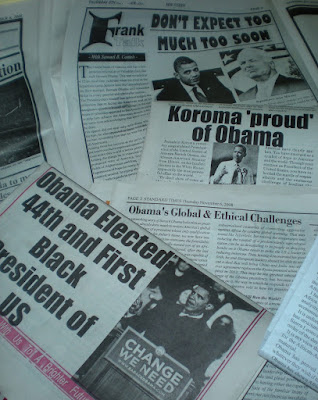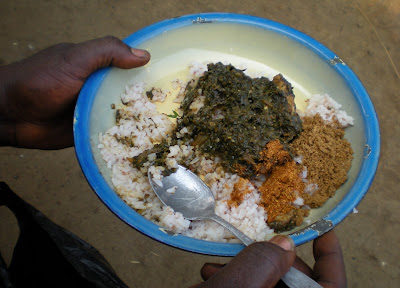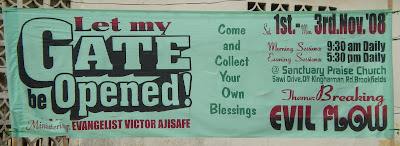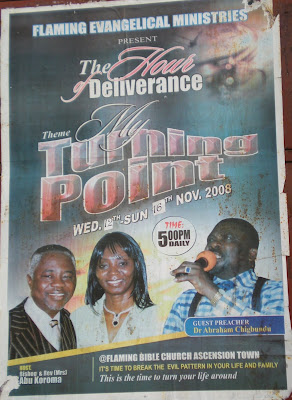Witnessing the election of Barack Obama from Sierra Leone has been quite a treat. While I longed for the saturation coverage of the U.S. networks and cable channels, the enthusiasm generated in Freetown made up for the absence of Rachel Maddow, Donna Brazile, and other favourite commentators.
But I have to admit I would have given just about anything to be back in Grant Park on Nov. 4, 2008!

People here are huge Obama supporters. For obvious reasons, they believe American foreign policy under his leadership would prove more favourable to Africa. They figure he would at least know where it is, and what it is. Newsweek’s recent revelation that Sarah Palin “didn’t understand” that Africa is a continent is deeply disturbing.
In the days leading up to the vote, Obama’s name was on everybody’s lips. BBC Africa was in full campaign coverage mode. Monday evening, our group of ex-pat and local runners went on its weekly ramble around Freetown. At one point, as we made our way around crowded backyards, young boys on a porch began to shout “Obama, Obama!”
On election night, I attended a reception at the U.S Embassy, where Ambassador June Carter Perry addressed a crowd of more than a hundred guests. Whatever the outcome at the polls, a historical precedent would be set, she said, also stressing that America would emerge as a united nation, firmly rooted in democratic principles, and looking to the next generation for inspiration. Later, one of her assistants announced the results of the mock voting booth, where non-American citizens had been invited to cast a paper ballot. Obama had won in a landslide.
Following the reception, a colleague and I got a ride back in town on the shuttle bus taking the large day-shift squad of security guards down Signal Hill. Although their conversations were mostly in Krio, it was easy to get a sense of their enthusiasm for Obama’s chances of becoming the first African American U.S. president. Their admiration for him appears boundless, their belief in his power to change the world, unshakeable. Only one of them said he was a McCain fan. His reason had something to do with the Middle East. The others boisterously argued with him, asking if he wanted to be sent to Iraq.
A few hours later, some of us watched the coverage on NBC via the U.S. Armed Forces satellite service. By 1 a.m. local time, Pennsylvania was called. When Ohio and then Florida also turned blue, it became clear that the voodoo vote counts of the past would not taint nor invalidate Obama’s victory. As the sun came up in West Africa, tv sets and radios were tuned to Grant Park. In the heat of the night, the world had indeed changed. Everybody knew it. Nobody missed the old days. I suspect even that security guard will get used to the new paradigm.
At 9 a.m. on Wednesday, my motorcycle driver called to say “Hey Marie-Jo, Congratulations!” He knows I am Canadian, but on that day I didn’t mind being lumped in with a country that has finally opted for progress and inclusiveness over fear and division.
The local papers went to print well before the first polls closed. One of them stretched its deadline and put Obama’s win in New Hampshire on the front page. But on Thursday, articles about the new President Elect filled the news and commentary sections. Sierra Leone’s president, Ernest Bai Koroma, released a statement of congratulations.


While we think of “elect” as “in-waiting,” people here focus on the plain definition of the word. My journalism students were fascinated by McCain’s concession speech and his promise to collaborate with the new administration. In a country that last year saw its first peaceful transition of power in over a decade, young adults are learning new political habits. For them, “elect” simply means “legitimate,” a rare and precious assurance that the inauguration of a new leader will not lead to civil unrest and violence.
By embodying the democratic process’s transformative potential, a victorious Barack Obama has already begun to influence the world community. This week in Freetown, the daily miseries of life in one of the world’s least developed countries were put on hold. But in January, when the Harmattan wind begins to blow, people will expect it to bring change. Africa is used to waiting. Maybe this time it won’t be in vain.



























